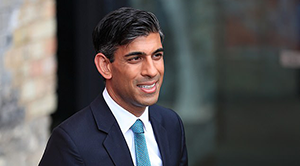 Amidst all of the chaos surrounding Downing Street in the past months, one figure continues to remain popular among members of parliament and the public alike. Rishi Sunak is regarded as the top candidate to replace Boris Johnson if the current PM’s departure becomes imminent.
Amidst all of the chaos surrounding Downing Street in the past months, one figure continues to remain popular among members of parliament and the public alike. Rishi Sunak is regarded as the top candidate to replace Boris Johnson if the current PM’s departure becomes imminent.
Indeed, there is a lot to like about the UK-born Chancellor of the Exchequer who rose to the position in 2020. A Brexit supporter and a reportedly affable and organised individual, he has managed to win the approval of many MPs within the Tory Party. He also has an impressive social media presence carefully curated to promote “Brand Rishi”, which gives him somewhat of a celebrity status among younger voters.
Although there are many factors that make him an appealing candidate for the position, there are also some aspects of his career that might end up harming his chances of becoming PM or at least make the endeavour very challenging. His position as chancellor has resulted in him making many difficult decisions, and some of the measures he introduced during the pandemic are not well-liked.
The Downing Street Scandals – Why The UK Government Could Be Facing a Change of Leadership During The Parliament’s Midterm
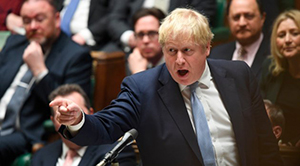 The Tory brand has been under fire in recent months thanks to a number of scandals centred around Prime Minister Boris Johnson. The so-called “partygate” problem has been causing problems at Westminster for weeks now, and the term refers to Downing Street parties said to have, allegedly, taken place during the UK’s 2020 and 2021 lockdown.
The Tory brand has been under fire in recent months thanks to a number of scandals centred around Prime Minister Boris Johnson. The so-called “partygate” problem has been causing problems at Westminster for weeks now, and the term refers to Downing Street parties said to have, allegedly, taken place during the UK’s 2020 and 2021 lockdown.
If found guilty, the PM could face a fine, but its significance pales in comparison to the further damage it would do to his image and the Conservative party’s reputation as a whole. This would be the true cost of his transgression if they are proven to have been committed, which is why many party members await the results of the investigation by Scotland Yard and the day Sue Grey’s full report on the matter will become public.
This is not all, however, as Boris Johnson further worsened the situation by making statements that fueled a right-wing conspiracy theory regarding current Labour party leader Keir Starmer. The former Director of Public Prosecutions was attacked by an anti-vaxxer mob near Parliament, an incident that, according to many, would not have happened had it not been for Mr Johnson’s unfounded accusations. The PM’s refusal to apologise led to several high-rank aides leaving their posts.
There are many potential candidates for the prime minister position. So far, however, sportsbooks suggest that the most likely to succeed Boris Johnson is the current Chancellor of the Exchequer, Rishi Sunak.
Rishi Sunak Background and Political Career
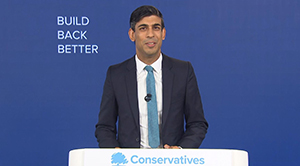 Rishi Sunak was born on May 12, 1980, in Southampton, to father Yashvir who was a general practitioner and mother Usha who was a pharmacist. He attended Winchester College, which is a private school in Winchester, Hampshire. Mr Sunak continued his education at Lincoln College, Oxford, and he also studied at the Stanford Graduate School of Business, which is where he gained his MBA.
Rishi Sunak was born on May 12, 1980, in Southampton, to father Yashvir who was a general practitioner and mother Usha who was a pharmacist. He attended Winchester College, which is a private school in Winchester, Hampshire. Mr Sunak continued his education at Lincoln College, Oxford, and he also studied at the Stanford Graduate School of Business, which is where he gained his MBA.
The current Chancellor of the Exchequer spent four years working as an analyst at the Goldman Sachs investment bank and then proceeded to work in hedge fund management. At Stanford, he met his wife Akshata Murthy, and their marriage made him son in law of Indian businessman and billionaire N. R. Narayana Murthy.
His political career began when he became a candidate for the Conservative MP position at Richmond, Yorks, which he won in 2015. He was and is a firm Brexit supporter, and was appointed Parliamentary Under-Secretary in 2018. In 2019, Mr Sunak gained the Chief Secretary to the Treasury position and remained as such until February 2020, when he was appointed as Chancellor of the Exchequer, making him one of the youngest MPs to reach a position of this significance. This practically coincided with the start of the Covid 19 pandemic, which is part of the reason he was put under the spotlight soon after his appointment.
The Reasons Behind Rishi Sunak’s Popularity
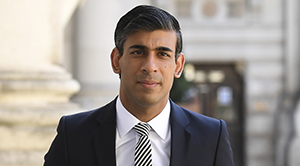 Rishi Sunak is currently dubbed as a “Prime Minister-in-waiting”, which shows just how much people are counting on him to succeed Mr Johnson, and a good chunk of his popularity can be explained with “Brand Rishi”. Mr Sunak has active Instagram and Twitter accounts, and his catchy videos and phrases, as well as photos of him and his dogs, seem to attract a younger crowd. This is something other Conservative party members often fail at achieving, which makes him valuable to the Tories in more ways than one. His character is often described as charming and friendly by those who know him, and he is also well-respected for his brilliant mind.
Rishi Sunak is currently dubbed as a “Prime Minister-in-waiting”, which shows just how much people are counting on him to succeed Mr Johnson, and a good chunk of his popularity can be explained with “Brand Rishi”. Mr Sunak has active Instagram and Twitter accounts, and his catchy videos and phrases, as well as photos of him and his dogs, seem to attract a younger crowd. This is something other Conservative party members often fail at achieving, which makes him valuable to the Tories in more ways than one. His character is often described as charming and friendly by those who know him, and he is also well-respected for his brilliant mind.
Often referred to as the “rising star of politics”, he is also said to be quite detail-oriented and organised, and this combined with his charms and well-kept demeanour make him the perfect contrast to Mr Johnson’s boisterous persona and unkempt appearance.
It is not just bells and whistles that make him an attractive candidate, however, since his work as an MP and chancellor have also impressed Westminster. First and foremost, Mr Sunak was one of the key players in making Brexit come to fruition, as he has been an avid Brexiteer since Mrs Theresa May’s leadership which began in 2016.
His Coronavirus Job Retention Scheme also managed to help many people keep their positions during the height of the pandemic. It is estimated that the number of furloughed positions is around 11.7 million, and over 140,000 businesses took part in this scheme.

Additionally, as reported by The Guardian, the unemployment rate in the UK is currently on pre-pandemic levels. As seen from the Office for National Statistics (ONS) and according to Sunak himself, employment is “at a record high”, a feat that needs to be taken into consideration.
Payrolled employee numbers are at a record high and redundancies are at an all-time low thanks to our #PlanforJobs. https://t.co/E96CVMgxtn
— Rishi Sunak (@RishiSunak) February 15, 2022
Why Some MPs Are Opposed to Rishi Sunak Becoming PM
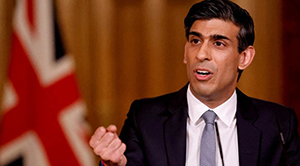 Rishi Sunak’s biggest disadvantage is his position as counsellor during such uncertain times. The rise of energy bills have made life difficult for the British populace, and the elderly have even been reported to forgo warming up their homes entirely in an effort to save money. Earlier, we mentioned that unemployment is lower in the UK, but it is also important to point out that the cost of living is rising thanks to wages remaining practically stagnant while bills continue to soar. The scope of people who will be hurt as a result is difficult to imagine, and at the centre of all of this stands Mr Sunak.
Rishi Sunak’s biggest disadvantage is his position as counsellor during such uncertain times. The rise of energy bills have made life difficult for the British populace, and the elderly have even been reported to forgo warming up their homes entirely in an effort to save money. Earlier, we mentioned that unemployment is lower in the UK, but it is also important to point out that the cost of living is rising thanks to wages remaining practically stagnant while bills continue to soar. The scope of people who will be hurt as a result is difficult to imagine, and at the centre of all of this stands Mr Sunak.
On a similar note, his background is a major factor in why some people see him as unfit for the role of prime minister. As established, Rishi Sunak is a former banker and the son in law of a billionaire, both of which make him an exceptionally wealthy individual. In fact, he is said to be one of the richest MPs at Westminster. Someone this well off being in charge of the UK can pose a problem according to many individuals.
He is also quite inexperienced within the political sphere all things considered, seeing as his career started in 2015. This is in stark contrast to other potential candidates such as Liz Truss who has been in politics for over two decades. This lack of experience can make it difficult for MPs or the public to trust in his abilities, especially since we are yet to see how he would perform in post-pandemic circumstances.
Speaking of which, certain Covid related decisions and policies of his have also come under scrutiny. One such controversial measure was Mr Sunak’s “Eat Out to Help Out” scheme which was designed to aid businesses in the hospitality sector during the pandemic. As part of the scheme, the government subsidised meals and drinks for participating restaurants, pubs, hotels and the like, in an effort to boost the hospitality industry and create more job positions. It was applied on August 3, 2020, and lasted until the end of the month. Although it reportedly did increase employment, researchers claim that the campaign was responsible for a rise in Coronavirus cases within areas where businesses participated in “Eat Out to Help Out”. This, along with the fact that the entire scheme cost the government a reported £849 million in subsidised meals, makes this a major point of contention between Rishi Sunak’s supporters and critics.
Last but not least, Rishi Sunik also admitted that he had attended Johnson’s alleged surprise birthday party in 2020, which is one of the gatherings that are under investigation by Scotland Yard. According to Mr Sunak, he had been at the location to attend a meeting regarding the UK’s Covid situation, but this is nonetheless yet another factor that can further damage his reputation.
Rishi Sunak to Become The Next UK Prime Minister Odds
Evidently, opinions regarding the current Chancellor of the Exchequer vary, and there are a lot of uncertainties surrounding whether or not Mr Johnson will even be ousted in the first place.
One thing that seems to remain a constant right now, however, is sportsbooks’ current views on what Rishi Sunak’s chances of becoming the next prime minister are. He is, at the time of writing, the undisputed favourite if we are to take the odds into consideration.
In addition, the odds of the top 5 potential candidates, in general, do not differ too much from sportsbook to sportsbook. Mr Sunak is often followed by Liz Truss, a fellow Tory member of parliament who is favoured among Conservative MPs and is an outspoken Brexiteer. Sir Keir Starmer also tends to rank quite high at bookmakers. He is typically next in line after Liz Truss, and he even overtook her in popularity at Bet365. This is no doubt a result of the Tory Party’s general reduction of popularity observed at polls.
Jeremy Hunt is also considered likely to be PM at sportsbooks. He used to be Mr Johnson’s rival and recently stated that his “ambition to be Prime Minister has not completely vanished”. Tom Tugendhat, an Afghanistan veteran, is also a potential candidate. He is bold in his readiness to assume the PM position if necessary and has described his colleagues’ reluctance to show a similar attitude as “coy”.
All in all, Sunak does have competition, and although he is currently most likely to win according to sportsbooks, do keep in mind that the odds are not permanent. As the United Kingdom’s political situation continues to develop, sportsbooks will, as always, update the odds accordingly.
| UK Next Prime Minister Odds | ||||||||||
|---|---|---|---|---|---|---|---|---|---|---|
| Candidate | William Hill | Unibet | Betway | Ladbrokes | 888sport | Betfred | BetVictor | MansionBet | Bet365 | Bet UK |
| Rishi Sunak | 6/4 | 5/4 | 6/4 | 13/8 | 5/4 | 7/4 | 11/8 | 6/2 | 6/4 | 5/4 |
| Liz Truss | 13/2 | 5/1 | 11/2 | 7/1 | 6/1 | 7/1 | 6/1 | 6/2 | 13/2 | 5/1 |
| Keir Starmer | 8/1 | 7/1 | 8/1 | 9/1 | 7/1 | 8/1 | 7/1 | 7/1 | 6/1 | 7/1 |
| Jeremy Hunt | 8/1 | 7/1 | 7/1 | 8/1 | 9/1 | 9/1 | 7/1 | 7/1 | 8/1 | 7/1 |
| Tom Tugendhat | 8/1 | 7/1 | 8/1 | 9/1 | 7/1 | 9/1 | 9/1 | 8/1 | 9/1 | 7/1 |
| Penny Mordaunt | 12/1 | 10/1 | 12/1 | 12/1 | 10/1 | 11/1 | 12/1 | 12/1 | 12/1 | 10/1 |
| Sajid Javid | 16/1 | 17/1 | 20/1 | 25/1 | 16/1 | 25/1 | 16/1 | 20/1 | 25/1 | 17/1 |
| Michael Gove | 16/1 | 20/1 | 20/1 | 20/1 | 16/1 | 25/1 | 16/1 | 20/1 | 33/1 | 18/1 |
| Dominic Raab | 20/1 | 20/1 | 20/1 | 14/1 | 20/1 | 25/1 | 25/1 | 20/1 | 28/1 | 19/1 |
| Ben Wallace | 20/1 | N/A | N/A | 25/1 | N/A | 33/1 | N/A | N/A | 40/1 | N/A |
| Steve Baker | 28/1 | 30/1 | 40/1 | 33/1 | N/A | 33/1 | 22/1 | N/A | 33/1 | 24/1 |
| Priti Patel | 28/1 | 33/1 | 33/1 | 40/1 | 20/1 | 33/1 | 28/1 | 28/1 | 33/1 | 25/1 |
| Nadhim Zahawi | 28/1 | 25/1 | 33/1 | 33/1 | N/A | 33/1 | 28/1 | N/A | N/A | 22/1 |
| Tobias Ellwood | 33/1 | N/A | N/A | 50/1 | N/A | 66/1 | 60/1 | N/A | 66/1 | N/A |
| Grant Shapps | 50/1 | N/A | 50/1 | 66/1 | N/A | 66/1 | N/A | N/A | 80/1 | N/A |
| David Frost | 50/1 | N/A | N/A | 50/1 | N/A | 50/1 | 100/1 | N/A | 40/1 | N/A |
| Kwasi Kwarteng | 50/1 | N/A | 66/1 | 100/1 | N/A | 66/1 | 50/1 | N/A | 50/1 | N/A |
| Mark Harper | 50/1 | N/A | 50/1 | 66/1 | N/A | 50/1 | 50/1 | N/A | 66/1 | N/A |
| James Cleverly | 50/1 | N/A | 50/1 | 66/1 | 25/1 | 50/1 | 50/1 | 50/1 | 50/1 | N/A |
| Kemi Badenoch | 66/1 | N/A | 50/1 | 80/1 | N/A | 66/1 | 100/1 | N/A | 50/1 | N/A |
- Author


